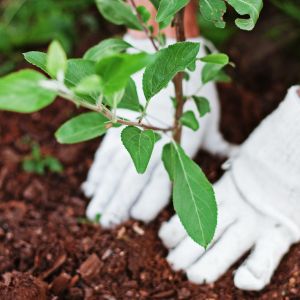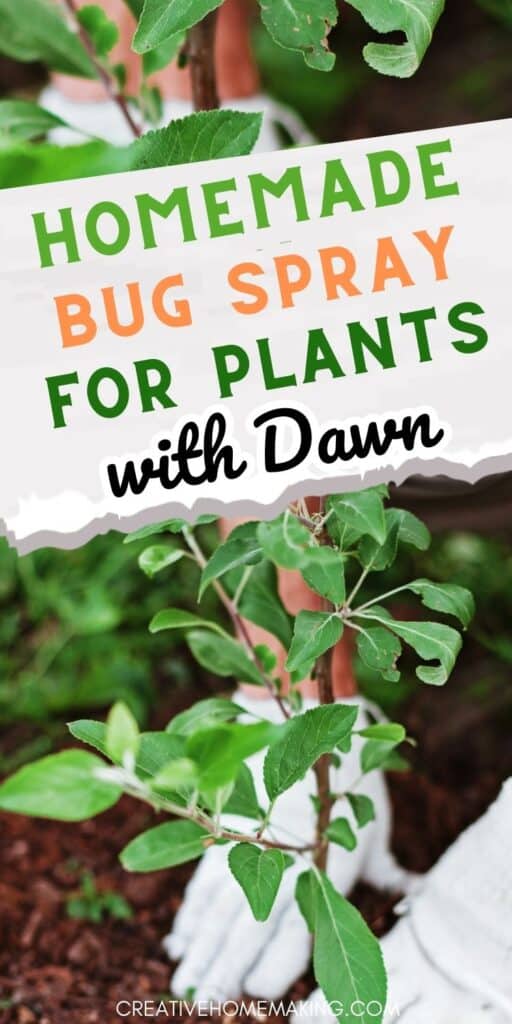Are you tired of pesky bugs ruining your garden? Homemade bugspray with Dawn dish soap might be the solution you’re looking for.
This post may contain affiliate links.
Dawn dish soap is a well-known brand that is often used for cleaning dishes, but did you know it can also be used to kill garden pests? Many gardeners have found that a mixture of Dawn dish soap and water can effectively repel and kill insects without harming plants.
Making your own bug spray with Dawn dish soap is simple and cost-effective. All you need is a spray bottle, water, and a few drops of dish soap.
This natural alternative to store-bought insecticides is a great way to keep your garden healthy and free from harmful chemicals.
Plus, you can customize the strength of the spray by adjusting the amount of dish soap used. With this easy DIY recipe, you can say goodbye to pesky bugs and hello to a thriving garden.
Related Article: How to Kill Squash Bugs
Understanding the Need for Homemade Bug Spray
If you’re a plant lover, you know how frustrating it can be when garden pests start attacking your beloved plants. Garden pests can cause damage to your plants, affecting their growth and yield.
While there are many commercial bug sprays available in the market, they can be expensive and contain harmful chemicals that may not be safe for your plants or the environment.
This is where homemade bug spray with dawn comes in. Making your own bug spray is an affordable and safe way to protect your plants from pests. Homemade bug spray with dawn is made using common household ingredients, making it easy to make and use.
Related Article: How to Get Rid of Tent Caterpillars
Insects are attracted to plants for various reasons, including food, shelter, and a place to lay their eggs. When left unchecked, pests can quickly multiply and cause significant damage to your garden.
Homemade bug spray with dawn can help you control pests and keep your garden healthy.
Using homemade bug spray with dawn is an effective way to control pests in your home garden. It is especially useful for indoor plants that are more susceptible to pests due to the lack of natural predators.
Homemade bug spray with dawn can also be used on outdoor plants to protect them from pests without harming beneficial insects.
Related Article: 5 DIY Bug Sprays for the Garden
The Importance of Dawn in Bug Spray
When it comes to making homemade bug spray for your plants, Dawn dish soap is a popular and effective ingredient. But why is Dawn so important in bug spray? Let’s take a closer look.
First of all, Dawn is a liquid dish soap that is gentle and mild, making it safe to use on your plants. It is also readily available in most households, making it a convenient ingredient to use when you need to make a quick batch of bug spray.
But what makes Dawn particularly effective in bug spray is its ability to break down the protective coating of insects, causing them to suffocate and die.
This is because Dawn contains surfactants, which are compounds that reduce the surface tension of water and make it easier for the soap to spread and penetrate the insect’s body.
When using Dawn in bug spray, it is important to dilute it with water to avoid damaging your plants. A common recipe for homemade bug spray using Dawn is to mix one tablespoon of the dish soap with one quart of water.
This mixture can then be sprayed directly onto your plants to kill off any unwanted insects.
Related Article: Does Vinegar Keep Mosquitoes Away?
Creating Your Own Bug Spray
If you’re looking to make your own homemade bug spray for plants, using Dawn dish soap can be an effective and natural solution. Here’s what you need to know to create your own bug spray:
Recipe
To make your own bug spray with Dawn, you’ll need:
- 1 tablespoon of Dawn dish soap
- 1 quart of water
Simply mix the Dawn and water in a spray bottle and shake well before use. Using Dawn dish soap as a bug spray can be an effective way to control pests on your plants.
The soap works by breaking down the insect’s outer layer, causing them to dehydrate and die. This method is particularly effective against soft-bodied insects like aphids and spider mites.
Related Article: What Plants Benefit from Baking Soda?
Application and Effectiveness
When applying homemade bug spray with Dawn to your plants, it’s important to do so in a way that maximizes its effectiveness. Here are some tips to keep in mind:
- Spray your plants in the morning or evening when the temperatures are cooler and the sun is not as intense. This will help prevent the spray from evaporating too quickly and ensure that it stays on the plants for longer.
- Be sure to spray the undersides of leaves, where many pests like to hide. This will help ensure that you are targeting the pests directly and increasing the effectiveness of the spray.
- When applying the spray, be careful not to get it in your eyes or on your skin. While Dawn is generally safe to use around humans, it can still cause irritation if it comes into contact with your eyes or skin.
In terms of effectiveness, homemade bug spray with Dawn can be quite effective against a wide range of pests. Here are some of the pests that the spray can help control:
- Aphids
- Boxelder bugs
- Japanese beetles
- Mealybugs
- Scale insects
- Spider mites
While the spray may not be effective against all types of pests, it can be a great option for those looking for a natural and cost-effective way to control pests in their gardens. Just be sure to follow the application tips above to ensure that you are using the spray as effectively as possible.
Related Article: Homemade Weed Killer
Alternative Homemade Pesticides
If you’re looking for alternative homemade pesticides to use in your garden, there are many options to choose from that don’t involve using chemical pesticides.
One popular option is to make your own insecticidal soap using castile soap, which is a natural and gentle soap made from vegetable oils. Simply mix one tablespoon of castile soap with one quart of water and spray the mixture onto your plants.
Another option is to use natural pesticides that are effective at repelling pests without harming beneficial insects. For example, you can make a homemade insecticide using hot peppers, garlic, and water.
Simply blend the ingredients together and spray the mixture onto your plants. The spicy scent of the peppers and garlic will help to keep pests away.
Related Article: How to Grow Marigolds in Pots: Tips and Tricks for a Blooming Garden
Diatomaceous earth is another natural pesticide that can be effective at repelling pests. This powdery substance is made from the fossilized remains of tiny aquatic organisms and works by dehydrating insects.
Simply sprinkle a thin layer of diatomaceous earth around the base of your plants to keep pests away.
If you’re looking for an organic pest control option, consider using beneficial insects such as ladybugs and lacewings. These insects can help to keep pest populations under control by feeding on them.
You can attract these insects to your garden by planting flowers that they are attracted to, such as daisies and marigolds.
When using any homemade pesticide, it’s important to test it on a small area of your plants first to make sure that it doesn’t harm them. Additionally, it’s important to remember that even natural pesticides can be harmful to beneficial insects if used improperly.
Always follow the instructions carefully and use pesticides sparingly to avoid harming the environment.
Follow my gardening board on Pinterest.



